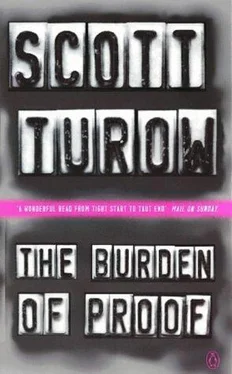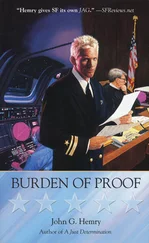Scott Turow - The Burden of Proof
Здесь есть возможность читать онлайн «Scott Turow - The Burden of Proof» весь текст электронной книги совершенно бесплатно (целиком полную версию без сокращений). В некоторых случаях можно слушать аудио, скачать через торрент в формате fb2 и присутствует краткое содержание. Жанр: Детектив, на английском языке. Описание произведения, (предисловие) а так же отзывы посетителей доступны на портале библиотеки ЛибКат.
- Название:The Burden of Proof
- Автор:
- Жанр:
- Год:неизвестен
- ISBN:нет данных
- Рейтинг книги:3 / 5. Голосов: 1
-
Избранное:Добавить в избранное
- Отзывы:
-
Ваша оценка:
- 60
- 1
- 2
- 3
- 4
- 5
The Burden of Proof: краткое содержание, описание и аннотация
Предлагаем к чтению аннотацию, описание, краткое содержание или предисловие (зависит от того, что написал сам автор книги «The Burden of Proof»). Если вы не нашли необходимую информацию о книге — напишите в комментариях, мы постараемся отыскать её.
The Burden of Proof — читать онлайн бесплатно полную книгу (весь текст) целиком
Ниже представлен текст книги, разбитый по страницам. Система сохранения места последней прочитанной страницы, позволяет с удобством читать онлайн бесплатно книгу «The Burden of Proof», без необходимости каждый раз заново искать на чём Вы остановились. Поставьте закладку, и сможете в любой момент перейти на страницу, на которой закончили чтение.
Интервал:
Закладка:
He would never:really know what lay inside.
With his usual abject look, Remo Cavarelli aided in the marble corridor outside the court-m of United States District Court Judge oira Winchell.
Stern hung on to Remo like an old tie-one too garish and oddly proportioned to accompany any part of the current wardrobe. With his coarse hands and North End speech, Remo was an embarrassment to the young lawyers in Stern's office, who were accustomed to Stern's current trade-business people and professionals overcome by material appetites or caught up in ambiguous circumstances. But Remo had been a client for nearly three decades, and Stern would not abandon him. He had first approached Stern in the teeming halls of the North End police court and reappeared every.few years in the midst of one scrape or another, a tough block of a man with the roughened brown face of a mariner.
Remo was a thief. He stole as a profession, with attitudes not unlike a professional hunter's. He admired what he stole; he enjoyed taking it; he looked forward to doing it again. And he regarded apprehension as part of his calling.
Each time he went to jail, and he had done three stretches 'already-he lamented the effect on his family. On the last occasion, Stern remembered, Remo had wept wildly as he contemplated separation from his young son. But he had come of age among men who made bluff pronouncements about the time they had done. And so, when he was caught, Remo Cavarelli plead guilty.
That was how he intended to answer the indictment pending against him here for conspiring to loot an interstate shipment. Not today, of course. Like a man with a toothache, the only thing that Remo regarded as worse than his present predicament was its solution. But sooner or later,.after Stern had arranged another continuance or two, Remo would approach the bar and publicly admit his culpability.
And this time it would be against the advice of his lawyer.
The government's case was extremely weak-a conspiracy depending entirely on Remo's coincidental appearance at the site where a hijacked refrigerator truck was being unloaded of its cargo of beef sides. Stern had encouraged Remo to go to trial, even offered to adjust his fee, but Remo was not interested. Trials were for people who had a gripe. Remo had none. At this point, with his fourth conviction, Remo was likely to be gone for a number of years. But he remained resolute.
Before the courtroom door, Remo pumped Stern's hand and Stern took a moment to explain what would happen today. The period for pretrial motions was now past, and judge Winchell would set a trial date. Remo was to do nothing more than stand at Stern's side before the bench. His appearance was not required, but Stern urged Remo to attend nonetheless.
He would look like a tamed ruffian beside the lawyers as they spoke a language he could not understand.
His coat hung on him with an evident foreignness; his broad tie formed a hue knot and elevated the,collar points on Remo's polyester shirt.
Remo's head would list slightly throughout, and his large rough hands would Cling to his sides pathetically, as if, like awkward sensors, they could feel the cold weight of the bars. Stern had seen Remo perform this routine before, and standing beside Sandy, he would break even the hardest heart.
Today he would get the chance. Moira Winchell had started out as a federal prosecutor, and went on to spend a number of years as a big-firm litigator, one of those lawyers who attended to complex civil lawsuits, trading Himalayan masses of documents and seldom bringing cases to trial. Ten years ago, she had been the first woman named a federal judge in this district; by now, she had been elevated by her colleagues to chief. Moira was rightfully celebrated as the triumphal conqueror of generations of discrimination.
But, alas, there was a reason Moira had succeeded when others had not.
She was a tough cookie. And the bench had made her tougher. Facing the manifold burdens of life as a federal judge-crowded dockets, churlish lawyers, middling pay, and almost unlimited power-some people did not respond well. They came to the bench thrilled by the acclaim of their peers and became, in a short period of time, as temperamental as Caligula. Moira Winchell was one of them -snappish, sarcastic, even, at moments, downright mean. Stern had tried cases against Moira years ago, during the time she was a prosecutor, and forged with her a relationship of mutual regard. More recently, the judge and her husband, Jason, a-law school professor, had passed occasional intermissions with Stern and Clara at the symphony. There, soothed by the music, Moira was amiable, if a little haughty. But in her courtroom she was harder than granite.
"Mr. Stern, where are we going with this matter?" From the substantial height of the dark bench, Judge Winchell addressed him as soon as the clerk called the case for status. She gave no apparent attention to Moses Appleton, the Assistant United States Attorney who Stood beside Stern on the shoulder opposite Remo. Moses, a young black man, was a crackerjack lawyer-he figured for great things-but the prosecutors, all of them, were like cigar store Indians to many of the judges: fungible young functionaries routinely clamoring for vengeance.
Stern promptly complained about the prosecution, claiming that they had not provided enough information on the case for him to determine whether it should be "resolved without trial," an oblique reference to a guilty plea.
Judge Winchell, who had heard it all before, motioned him silent. -In the large old courtroom, lawyers, each awaiting his or her turn at the podium, sat by the dozens on the dark-lacquered benches, attending to the judge like a reverent congregation and all the while registering legal fees in six-minute increments.
"Two weeks for the government to file a Rule 801 statement, supported by 302s and grand jury testimony. We'll set the trial for two weeks thereafter. No continuances. Give them a date," said Judge Winchell to her minute clerk, who sat almost at ground level, four feet below. The clerk, Wilbur, who took his cues from the judge, called out a date next month like anannouncement of doom.
Remo, beside Stern, spoke up for the first time. "So soon?" he whispered. "Hush," said Stern.
On the bench, Judge Winchell whipped her straight dark hair back over her shoulder.
"Mr. Stern, might I have a word with you?" She started down the stairway beside the bench and, as Stern approached, waved Appleton away.
He was unnerved. Stern knew what was coming.
"Sandy," said Moira Winchell, suddenly beside him at his height, "I was terribly sorry to hear about Clara. We all think of you." She placed her long hand on Stern's shoulder and gave him a level look of real sadness. He found himself oddly moved by the judge's sincerity. Here in the strong light of the courtroom, where Moira did not bother with makeup, Stern was impressed by the toll reflected in her features. Her pretty Irish face was deeply lined now; her eyes held no amusement. One tended to forget the earnestness that underlay all her efforts. The world watched her, she knew, waiting for a serious mistake.
"Your Honor is most kind."
"Call," she said. "We'll have lunch."
Then she drew her black robe around her 'again as she ascended to her superior place. Her face was already wrinkled with its familiar look of irritation. More lawyers. More disputes. More decisions. Onward.
Both Appleton and Remo had waited a few feet away. "Moses," said Stern in the corridor, "I shall speak with you." Then he led Remo into the attorneys' room, a serene chamber with ancient oak desks and black-and-white photos of various judges of the court of decades past, all floured with dust and askew on the wall. Stern quickly summarized what had occurred. The judge would soon demand a final decision about whether Remo would plead guilty. Stern, again, urged him to proceed to trial, but Remo was clearly indifferent to this advice.
Читать дальшеИнтервал:
Закладка:
Похожие книги на «The Burden of Proof»
Представляем Вашему вниманию похожие книги на «The Burden of Proof» списком для выбора. Мы отобрали схожую по названию и смыслу литературу в надежде предоставить читателям больше вариантов отыскать новые, интересные, ещё непрочитанные произведения.
Обсуждение, отзывы о книге «The Burden of Proof» и просто собственные мнения читателей. Оставьте ваши комментарии, напишите, что Вы думаете о произведении, его смысле или главных героях. Укажите что конкретно понравилось, а что нет, и почему Вы так считаете.












